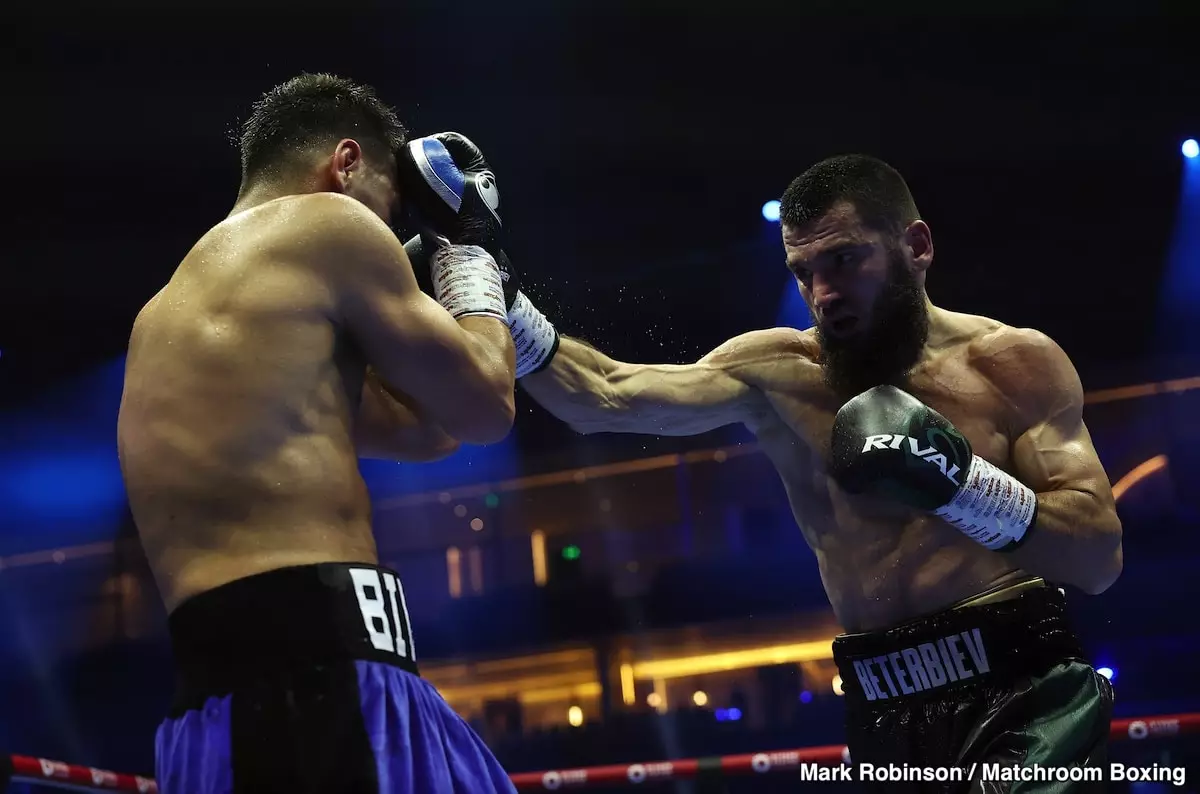Exploring the Possible Rematch Between Bivol and Beterbiev: A Comprehensive Analysis
The boxing world is buzzing with excitement over the potential rematch between Dmitry Bivol and Artur Beterbiev. After their intense bout last October, where Beterbiev emerged victorious via a majority decision, fans have been eagerly anticipating a sequel. Promoter Eddie Hearn has been quite vocal about his optimism for this rematch, calling it the essential fight for both contenders. While Hearn’s enthusiasm is contagious, it also warrants a closer examination of whether Bivol is truly ready to face the unified champion again.
As a boxing enthusiast myself, I can’t help but feel drawn into the drama and anticipation surrounding these two fighters. The first match was a nail-biter, keeping everyone on the edge of their seats. Watching the match unfold, you could feel the tension in the air, as each round brought new twists and turns. Reflecting on that night, it’s clear that both fighters left everything in the ring, making a rematch all the more exciting.
There’s something incredibly personal about following such an intense rivalry. As fans, we invest not just our time but our emotions into these bouts. It becomes more than just a sport; it’s a story of perseverance, skill, and sometimes redemption. You can’t help but wonder what strategies each fighter will employ in a rematch and how their preparation will differ from before.
Key Takeaways
- The potential rematch between Bivol and Beterbiev is generating significant excitement among boxing fans.
- Bivol’s ability to handle pressure and his tactical approach will be crucial in a future bout.
- The timing of the rematch may heavily influence both fighters’ strategies and readiness.
Bivol’s Performance Under Pressure
In their first encounter, Bivol started strong by showcasing impressive defensive skills and technical finesse. However, as the fight progressed past the seventh round, he began to falter. It was evident that as Beterbiev increased his aggression, Bivol’s vulnerabilities became more pronounced. This raises questions about his capacity to withstand pressure from a relentless opponent like Beterbiev. Despite being technically sound, his lack of knockout power—illustrated by 12 KOs out of 23 wins—puts him at a disadvantage against Beterbiev’s formidable knockout record of 20 KOs in 21 victories.

Bivol’s apparent hesitation during exchanges with Beterbiev does not bode well for his chances in a rematch. Should Beterbiev maintain his aggressive stance from the outset, as he did in their initial encounter’s latter rounds, Bivol might find it challenging to mount an effective defense or counterattack. Without bolstering his resilience under pressure, Bivol risks being overpowered once more, potentially affecting his standing as a top-tier light heavyweight contender.
Tactical Considerations for the Rematch
Promoter Eddie Hearn has yet to announce when this anticipated rematch might occur, leading to various tactical possibilities for both fighters. The IBF has mandated that Beterbiev defend his title against Michael Eifert first, raising questions about whether he will prioritize this obligation or aim to unify titles against Bivol instead. The timeline of any prospective rematch holds significant implications not just for Beterbiev’s title defense strategies but also for Bivol’s developmental trajectory as a boxer.
Timing is not only about logistical arrangements but also concerns Bivol’s physical and mental readiness. A rematch scheduled too soon could leave him mentally unsettled from their previous clash, while waiting too long may allow Beterbiev to refine his tactics further against him. Additionally, emerging talents like David Benavidez and David Morrell could increasingly pose threats if Bivol delays too much as they gain experience and power within the division.
The Broader Implications of a Rematch
The evolving dynamics within the light heavyweight division make every decision crucial for fighters like Bivol and Beterbiev. Their potential rematch symbolizes more than personal rivalry; it represents an ongoing battle for supremacy within one of boxing’s most competitive categories. Eddie Hearn’s endorsement of this fight indicates that he believes it will capture widespread attention from fans worldwide. However, it remains essential not to overlook or dismiss areas where Bivol needs improvement tactically.

While unpredictability defines boxing inherently—adding suspenseful intrigue—a pressing need exists for Dmitry Bivol to address shortcomings such as fortitude or aggressiveness if he hopes ultimately reclaim victory over Artur Betterbievin any future bout together again filled with high stakes heightened drama within ring atmosphere itself too!
Final Thoughts
As we look forward to what could potentially be another thrilling chapter between these two warriors inside ring walls—only time truly tells whether Dmitry can rise occasion capture title back from Artur amidst heightened drama surrounding event itself! Regardless outcome though surely guaranteed unforgettable experience everyone involved—from passionate fans dedicated promoters alike who eagerly anticipate next move made by either fighter involved here today!
In closing thoughts overall analysis seems clear: there still much uncertainty looming ahead regarding possible outcomes yet remain hopeful optimistic concerning ultimate resolution reached between them once dust finally settles post-fight conclusion eventually arrives down road sometime soon perhaps?
Bivol
Beterbiev
boxing analysis
rematch anticipation


Leave a Reply